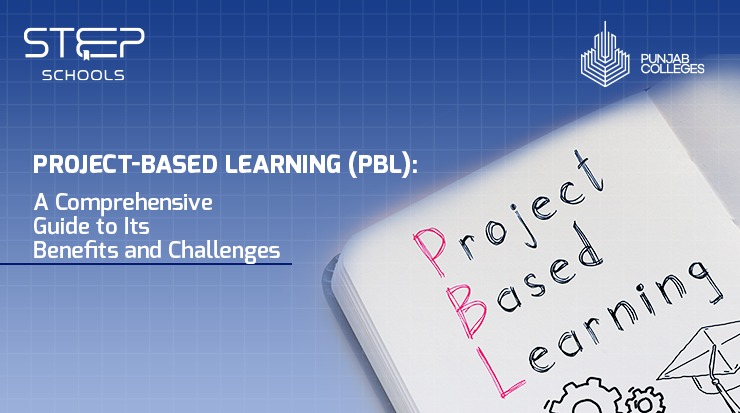Project-based learning (PBL) emerges as a transformative approach in education, aligning classroom experiences with real-world scenarios. Renowned education researcher Sylvia Chard underscores its significance by stating, “One of the major advantages of project work is that it makes school more like real life. It’s an in-depth investigation of a real-world topic worthy of children’s attention and effort.” STEP Schools opens Fall 2024 Admissions from Playgroup to Matric/O-Levels in 54 Campuses nationwide.

Traditional Learning
In earlier times, educational emphasis primarily revolved around academic achievements, often neglecting practical problem-solving skills. However, contemporary educational paradigms, notably project-based learning, bridge this gap by nurturing skills essential for thriving in a knowledge-driven society.
Inclusion of Project-Based Learning (PBL)
Project-based learning entails a dynamic teaching methodology in which students actively engage in designing, developing, and implementing hands-on solutions to authentic problems. Through structured projects, students tackle real-world challenges within specified time frames, fostering deep content comprehension, critical thinking, creativity, and communication skills.
How will Project-Based Learning Help Parents in the Long run?
Take Ahmed, a school-going child who struggles with public speaking and presentation skills. Whenever he must speak in front of his class or participate in debates, Ahmed becomes nervous, stumbles over his words, and finds it challenging to organize his thoughts effectively.
The same nervousness is clearly shown in front of common social interactions. Hence, parents are obviously feeling troubled.
Project-Based Learning (PBL) could be incredibly beneficial for Ahmed in this situation:
- Real-World Scenario:
PBL could start by presenting Ahmed with a real-world scenario, such as organizing a community event or participating in a school assembly where he needs to deliver a speech or presentation. - Active Learning:
Instead of just learning theoretical tips for public speaking, PBL would require Ahmed to actively research effective communication techniques, practice speaking in front of peers, and receive constructive feedback. - Skill Development:
PBL focuses on developing specific skills needed to address the problem. For Ahmed, this would involve practicing speaking techniques, learning how to structure a speech, using visual aids effectively, and improving his confidence in public speaking. - Collaboration:
Ahmed could collaborate with classmates with strong presentation skills or teachers who can provide guidance and mentorship. Working in teams allows Ahmed to learn from others’ strengths and receive support in areas where he struggles. - Reflection and Improvement:
Throughout the process, Ahmed would reflect on his progress, identify areas for improvement, and adjust his approach based on feedback received from peers and teachers. This iterative process helps him build confidence and continuously enhance his public speaking skills.
4 Phases of PBL
Ideally, project-based learning comprises four (4) phases or stages. According to the resources, the four phases of PBL are as follows.
- Identification of a problem
- Devising a solution and structured approach
- Developing a prototype
- Refining the solution based on feedback
It’s important to differentiate between a simple ‘project’ and project-based learning. While a project denotes assigned tasks, project-based learning (PBL) focuses on problem-solving, enabling students to cultivate skills and knowledge through practical engagement.
Benefits or Pros of Project Based Learning (PBL)
We will include the top 5 benefits of the PBL here. For more, you can read here.
- Cultivates Creative and Critical Thinking
PBL cultivates critical thinking by exposing students to diverse tasks, fostering adaptability crucial for professional environments.
- Accommodates Diverse Learning Styles
Acknowledging varied learning capacities, PBL offers interactive tools and diverse projects, catering to individual learning preferences and enhancing comprehension.
- Enhances Memory Retention
Active engagement in projects enhances memory retention as students apply theoretical knowledge, reinforcing learning through practical application.
- Facilitates Hands-On Learning
By immersing students in live projects, PBL promotes the application of theoretical knowledge in real-world scenarios, fostering practical skill development.
- Develops Team Management Skills
Collaborative projects enable students to refine teamwork, time management, and conflict resolution skills essential for professional success.
- Strengthens Problem-Solving Abilities
Real-world projects stimulate problem-solving skills, encouraging exploration of multiple solutions and resilience in overcoming challenges.
Challenges or Cons in Project Based Learning (PBL)
Everything has its own benefits and challenges or pros and cons. Project-Based Learning (PBL) is no exception. Therefore, till date, there is also room for improvement in PBL.
- Group Dynamics
Uneven participation and conflicts within groups can hinder project outcomes, necessitating effective management of group dynamics.
- Adaptability to Active Learning
Passive participation may impede engagement, requiring strategies to encourage active involvement and ownership of projects.
- Apathy
Students may struggle to identify interests, which can impact project engagement. Personalised support and motivation are essential to address apathy and enhance involvement.
- Productivity Issues
Freedom in project selection may lead to productivity challenges without proper guidance. Effective mentorship is crucial to maximise student productivity. Parents can also play an important role in this regard.
STEP Schools Offers STEAM Project Based Learning in 2024
We hope you now understand the possible pros, cons, benefits, or challenges of project-based learning (PBL). Our blog provides more exposure to project-based learning or the teacher’s role in it.
However, STEP Schools has opened Fall Admissions 2024. As the summer is about to end, our intake for the session has started. Take advantage of the opportunity to enroll your children to learn the latest 21st-century skills.
Online school admission applications for 2024 are accepted through our website. You can get the admission portal here.
For locations and other queries, you may contact us at info@stepschools.com
In Conclusion
Project-based learning offers a holistic approach to education, aligning classroom experiences with real-world demands. While it presents numerous benefits, addressing challenges requires collaborative efforts between educators and students. Embracing PBL prepares students for success in a competitive and technologically advanced landscape, making it a cornerstone of contemporary education. Remember Ahmed from our example. STEP Schools will help Ahmed overcome the resistance to public speaking with PBL.


